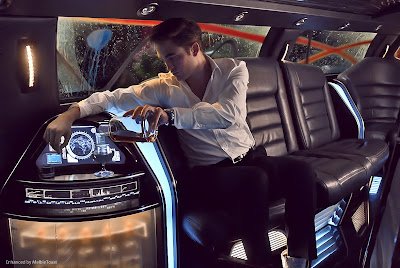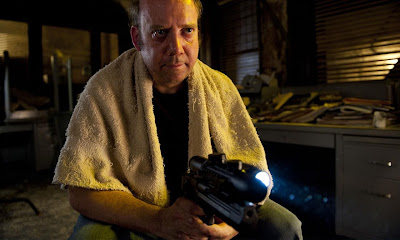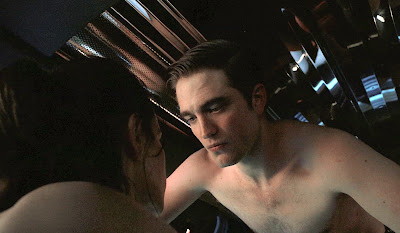A Potpourri of Vestiges Review
Our Rating: 9.0
 |
| Cosmopolis (2012) - By David Cronenberg |
IMDb Ratings: 5.5
Genre: Drama
Cast: Robert Pattinson, Juliette Binoche, Sarah Gadon
Country: France | Canada | Portugal | Italy
Language: English
Runtime: 109 min
Color: Color
Cosmopolis,
an adaptation of a 2003 novel of the same name by Don DeLillo, is a 2012 drama
film directed by Canadian filmmaker David Cronenberg. A nominee for the prestigious
Palme d'Or Award, Cosmopolis premiered at the 65th annual Cannes
Film Festival in May, 2012. Cosmopolis stars English actor Robert Pattinson in
the lead role of Eric Packer—an emotionally detached 28-year-old multi-billionaire
asset manager. Cosmopolis is an attempt to capture the abject hollowness
associated with our materialistic existence through the microcosmic world of Eric
Packer—a hyperrealistic manifestation of the modern man—confined to the
boundaries of a stretch limousine riding across Manhattan . In other words, Cosmpolis is a
tale of human decadence presented in form of a nightmarish rendezvous with the hyperreal—a glimpse of what awaits us.
 |
| Robert Pattinson as Eric Packer in David Cronenberg's Cosmopolis |
 |
| Eric Packer with his Billionaire Wife |
 |
| A Still from Cosmopolis |
 |
| Juliette Binoche as Didi Fancher in Cosmopolis |
 |
| Cosmopolis (2012): Richard Sheets a.k.a. Benno Levin |
Readers, please feel free to share your opinion by leaving your comments. As always your feedback is highly appreciated!
For more information on the title, please click on the following links:
For more information on the title, please click on the following links:
People who liked this also liked...








Sounds great. Thanks.
ReplyDeleteMy pleasure!
ReplyDeleteGood work Murtaza. There are so many people who hate this movie, so it's nice to see someone defend it so well.
ReplyDeleteThanks Bonjour... I am really glad to hear that from you :-)
ReplyDeleteI think a lot of what you described might've been the intent of the movie; I think a bit was redesigned that way to make up for Pattinson's lack of abilities as an actor, 'cause I don't think he was that good in it actually. I mean, there's playing emptiness but I don't- he doesn't have a character. He tends to be good, staying still, and having a camera on him; and that's about it, but the other than that, emotions is like a second language to him; I've yet to see a performance of his that I thought was good, and I usually gives benefits of a doubt to the actors, but...- It's a little Kafkaesque, but we basically, get all of this in the first ten minutes of the film. His life is a void, and it's a void for us the audience. It's not really one nightmare stop on the journey after another, it's one nothing after another. He's not even picaresque, nothing he does...- well I can end that sentence actually, he does nothing, everything enters his world and his sphere of vision, and he's not even interested in that, so I don't know why I was supposed to care. He doesn't even care about the haircut he's getting, much less the money or sex around him, or the protesters. There's symbolism and then there's just driving something into the ground. If it wasn't the last scene with Giamatti, which- and that's something that bothered me too, that sequence, alone, could've been a short film in of itself, and a decent one alone, that said more than, anything else in the rest of film, that was frustrating, 'cause as pointless as everything else seemed, that scene essentially just confirmed it. I don't know if Kafka's the right comparison actually, structurally, it reminded me of Vincent Gallo's "The Brown Bunny", which is also about a guy traveling, for most of the movie, and then there's a sequence at the end, that explains everything, a conversation between the Gallo and his ex-girlfriend played by Chloe Sevigny, but in that movie, there's a decent explanation for the hour of the film, being an existential journey, essentially to boring nothingness, but also the last scene, was a lot more full of depth. "Cosmopolis" seemed to me a simplistic allegory, basically talking about how capitalism is bad, and even the winners of the game are depressed and uncaring about it. Even works about have a driving force, and even that's literally in a traffic jam in the force-, Yeah I appreciate the thought, but I don't think a second viewing's gonna add much to it. One was plenty for me. I can stand some self-torture, but that would asking a lot.
ReplyDeleteI think Cosmopolis is the turning point in not only in Pattinson's career but also his career. He was going through a very tough phase following his break up with Stewart. Also, in his own words, Twilight fame left him struggling with depression for two years... his swift rise to fame after starring in the very first Twilight movie left him feeling exiled and alone. Pattinson said in an interview that he was saved from spiraling into depression when director David Cronenberg asked him to star in Cosmopolis. He wanted a change but realized that he will have to earn it. Pattinson said: 'I thought everything was going to be served on a plate but that's not how it works". Even though the movie didn't do well at the box office, it helped Pattinson in establishing himself as someone who wants to take his acting seriously.
ReplyDeleteNow, I can sense that you weren't impressed at all by Pattinson's acting... but, I was really please to see him finally discover the actor in him. You have written above: "His life is a void, and it's a void for us the audience." I believe it was quite deliberate on Cronenberg's part to highlight this void as an means to showcase the hollowness that is slowly becoming ubiquitous in today's world. Cronenberg wants to give us the glimpse of the hyperreal to capture the abject solitude associated with our materialistic existence. Anyway, it seems that you have already made up your mind on this... so, I won't proceed any further trying to convince you otherwise.
I would've bought that it was deliberate, if I didn't think that of his other performances as well. 'Cause I thought the same things with everything else I've seen him in. In "Water for Elephants", I thought he did nothing, in an even worse movie than this one, "Bel Ami", I thought the performance was much the same, and in that one he actually he was supposed to be this libertine-type character, and it was really bad there, and "Twilight" as well, although everybody's doing their worst work in those films, so if anything, I think Cronenberg exploited that tendency of his, but I would say like a Jesse Eisenberg perhaps in that role, would've found more interesting things to do, even with emptiness as a theme, 'cause even when you're empty as a person, it's still a thing, a part of a person, it engulfs you; it's not just a passivity, so until proven otherwise, could he could always surprise me with a new film, maybe it was depression, although I always tended to think that that relationship was more publicity than anything else, even still, I've yet to be impressed by a Robert Pattinson performance.
ReplyDelete